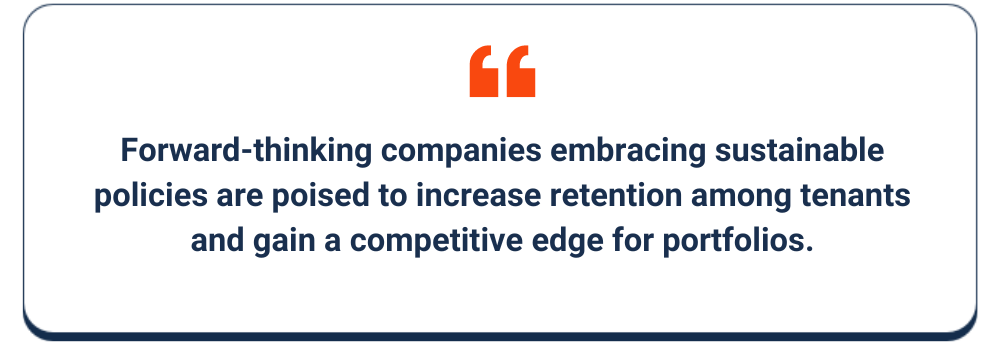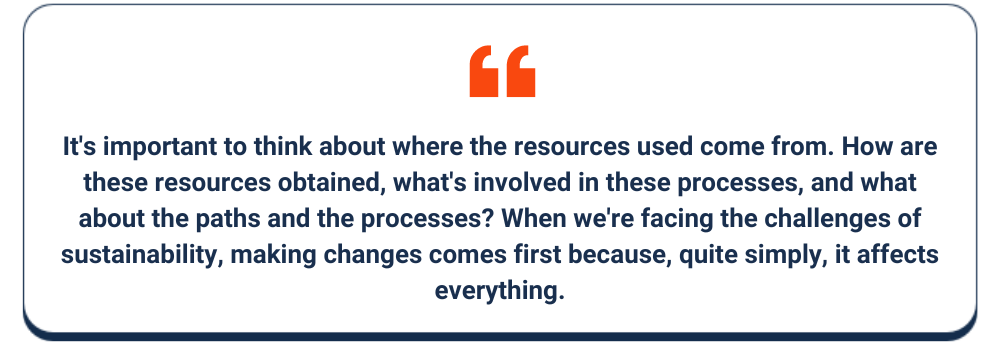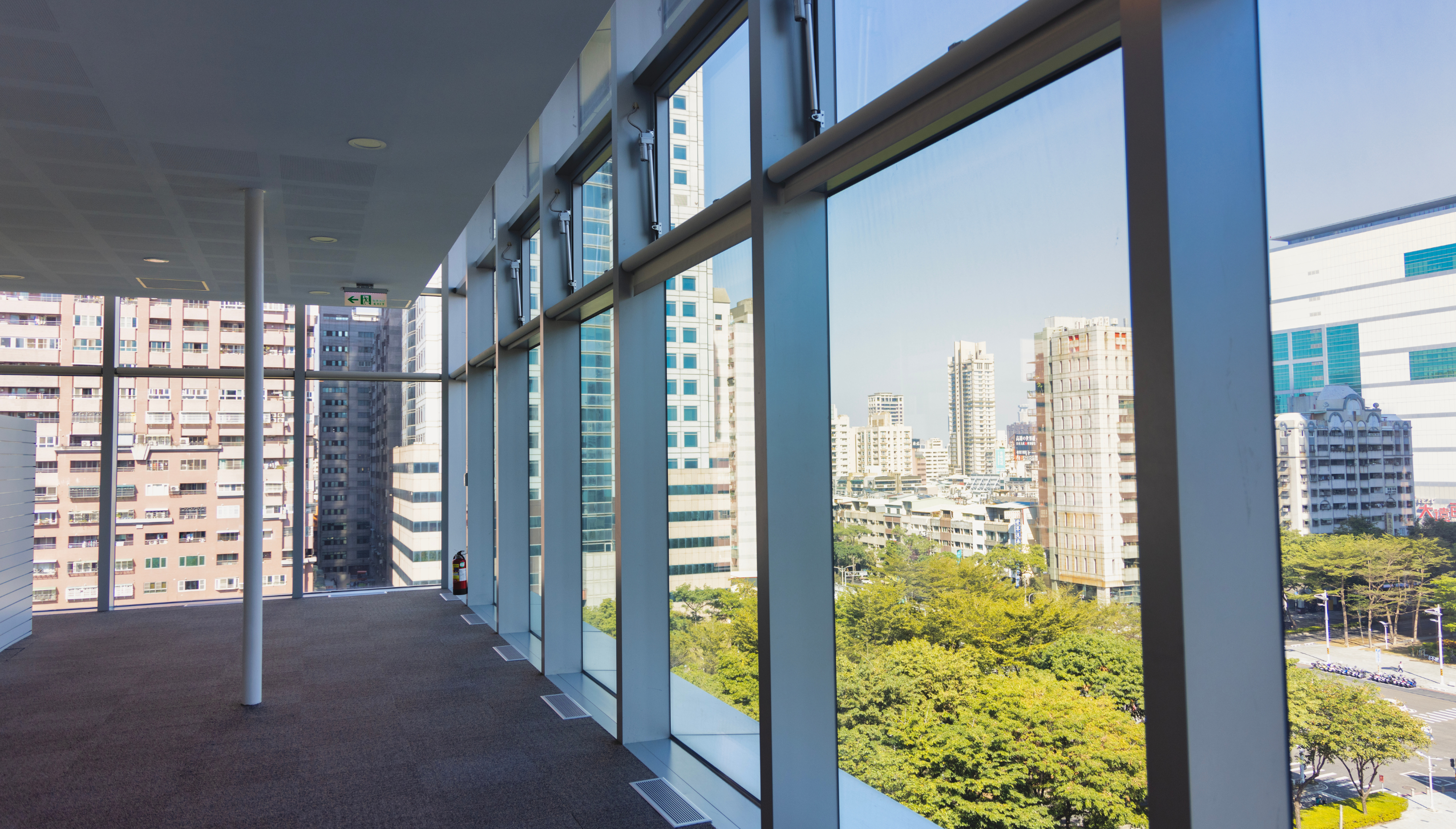As government policy in Washington continues to push for regulation that all industries embrace new Environmental, Social, and Governance (ESG) standards, the commercial real estate industry is now beginning to navigate and explore ways to leverage sustainable goals.
Not only considered morally correct, these practices have also proven to be cost-effective. Forward-thinking companies embracing sustainable policies are poised to increase tenant retention and gain a competitive edge in portfolio management.

You probably already know what it’s like to walk past an active construction site when a new commercial building goes up. Worse yet, it’s often the case that sustainability is not top of mind for those working on these projects. There’s a number of ways that the industry is attempting to tackle the problem and it’s important to review policies that seek ways to reduce individual carbon footprints among commercial sectors.
Green Building Certifications: Many building owners are pursuing renowned green building certifications like LEED or BREEAM that showcase a commitment to sustainability. These certifications assess water efficiency, air quality, material usage, and site sustainability, boosting a property’s marketability and attracting environmentally conscious tenants.
Water Conservation: Embracing and adopting water-efficient fixtures like low-flow toilets, faucets, and urinals while reducing reliance on municipal water sources can be a desired trait for prospective tenants. Other initiatives include regular inspections and promptly addressing leaks for efficient water usage throughout commercial properties.
Transportation and Accessibility: Fostering sustainable transportation options for your commercial property can be impactful. By providing amenities like bike racks, cyclists are encouraged to turn to alternative, eco-friendly choices for commuting. Additionally, installing electric vehicle charging stations and promoting the adoption of electric vehicles among tenants/visitors can ultimately reduce greenhouse gas emissions.
When we think about sustainability we often think only of CO2 emissions, but there is so much more to it. Dr. Irene Feige, a sustainability expert, spoke on this topic and stated the following:
It’s important to think about where the resources used come from. How are these resources obtained, what’s involved in these processes, and what about the paths and the processes? When we’re facing the challenges of sustainability, making changes comes first because, quite simply, it affects everything.

She points out that the way resources are obtained and used has just as much to do with environmental responsibility as how much CO2 is emitted into the air.
Construction is only one aspect; the other half involves diligent building maintenance. This process involves tools and supplies that when executed properly, extends a property’s lifespan, reducing waste by minimizing the need for frequent upkeep.
It’s incredibly important to utilize tools that tackle the problem of waste in commercial real estate construction. A few of these technological developments in recent years include the following:

Smart Sensors – These are special sensors that can detect office occupancy and turn off lights and other sources of energy usage when the office is not currently occupied. Cutting the lights when no one is in a room might seem like a small thing, but it’s a feature that more and more customers are asking for as they seek ways to reduce their environmental impact.
AI-Powered Windows – Artificial intelligence can detect how much sunlight is streaming in through office windows and adjust the tinting of those windows for an optimal lighting scenario during operating hours.
Automated HVAC Systems – HVAC systems can be a major drain on power, and it’s necessary to regulate excessive usage when they are not necessary.
All of these technologies improve the quality of sustainable building materials and make it possible to have the optimal setup for a new commercial building to be constructed.
Consumers and investors consider a lot more than just a company’s bottom line when evaluating business decisions. Ernst and Young found that 98% of investors stated that they looked at non-financial factors when considering an investment in any company. One of the big non-financial factors that they often look at is the existence of an ESG program. If such a program exists, it can be taken as a positive sign for investors when evaluating new business ventures.
All commercial property owners should consider the value the can add by creating sustainability initiatives that are important to their tenants and investors. When properly implemented and communicated, these initiatives can actually by marketed as key value drives in terms of attracting higher quality tenants, reducing turnover, and bolstering rents.
The industry is doing a lot to voluntarily work on improving its sustainability practices, but there’s also mandates being enacted in certain jurisdictions as well. The following are a few that you should keep an eye out for in 2023.
Lawmakers in New York City passed new regulations in 2019 on the amount of emissions that large buildings within the city could legally emit. The new regulations apply to roughly 50,000 buildings in New York, and the first compliance deadline comes in 2024. There’s great optimism that virtually all buildings will be compliant by 2024, but that’s just the first of a series of related deadlines. The New York Times reports that the next set (in 2030) likely won’t be so easy to meet:

For 2024, most buildings running reasonably efficiently, have LED lighting, and updated heating systems are going to hit the standards.
For 2030 however, it could take not just tuning up heating systems that run on oil or gas but replacing them with systems that run on electricity entirely. New buildings can be designed with the requirements of Local Law 97 in mind, but the difficulty comes with retrofits to older buildings.
Commercial real estate companies operating in New York must carefully consider how they will move forward with these new mandates in mind.
The COVID-19 pandemic brought awareness to the need for various building upgrades. The Clean Air and Buildings Challenge is not a mandate to update buildings, but a suggestion from the White House about how to most effectively do so.
A few of the guidelines that they included are as follows:
Create a Clean Indoor Action Plan – Take stock of your current indoor air quality and make plans to improve air that circulates in your commercial space.
Optimize Fresh Air Indoors – Look for ways to circulate outdoor air indoors to improve airflow.
Improve Air Filtration and Cleaning – Products that assist with improved air filtration and cleanliness.
There is no deadline for action on these steps, but certainly something to keep in mind.

An amendment passed in 2021 gives the Boston City Council the authority to set emissions standards for existing buildings within the city. Since buildings account for 70% of the emissions emitted, Boston’s local government has made it a point to tackle the problem head on.
The emission standards set by city officials requires buildings to slowly decrease their emission output over time – with a target goal to have all buildings in Boston at zero-emission standards by 2050.
These standards apply to buildings that meet the following criteria:
The local City Council is still working on precise targets for each milestone year between now and 2050.
Taxonomy Complementary Climate Delegated Act
The European Commission is also getting in on the act of clean building emissions. They released the Taxonomy Complementary Climate Delegated Act to address the issue of reducing emissions for European cities.
The EU’s goal is to become net carbon neutral by 2050. This particular act will greatly increase the disclosure requirements related to carbon emissions from gas and nuclear energy sectors. Both industries are expected to comply with these new standards while providing additional information to the public about their emissions on a more regular basis.
Organization is key when it comes to streamlining sustainability practices for your properties. That’s why at Fyxt, we’ve put emphasis on the ability to manage tasks from preventative maintenance to vendor relations and more. We equip businesses with powerful risk assessment tools, allowing them to identify potential hazards and take proactive measures to mitigate them. Our platform provides easy to use tools that empower properties to efficiently manage their operations. We aim to help property owners stay organized, proactive, and successful in their journey towards a greener and more sustainable future.
Building on a wealth of knowledge and expertise in both real estate and technology, Ryan set out on a mission to redefine the commercial property experience through technology and for the past 5 years has successfully built a team, product, and company to do just that. Ryan is also a member of the Forbes Real Estate Council.

Back-to-Back Wins: Fyxt Named PropTech’s 2025 Maintenance Platform of the Year We’re thrilled to announce that Fyxt has been recognized once again as the PropTech Maintenance Platform of the Year.

AI in CRE: Transforming Operations, Not Just Buzzwords Commercial real estate is no stranger to buzzwords: digital transformation, automation, AI. We’ve heard them all. But hype alone doesn’t drive real outcomes.

Fyxt is evolving to meet the needs of property managers and CRE professionals with innovative tools like Fyxt Rent Pay and the new Fyxt Vendor Pay.